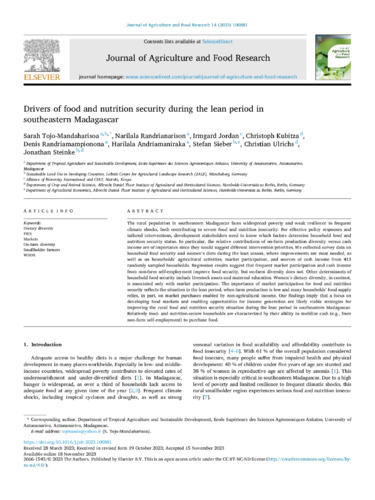Drivers of food and nutrition security during the lean period in southeastern Madagascar
The rural population in southeastern Madagascar faces widespread poverty and weak resilience to frequent climate shocks, both contributing to severe food and nutrition insecurity. For effective policy responses and tailored interventions, development stakeholders need to know which factors determine household food and nutrition security status. In particular, the relative contributions of on-farm production diversity versus cash income are of importance since they would suggest different intervention priorities. We collected survey data on household food security and women's diets during the lean season, where improvements are most needed, as well as on households' agricultural activities, market participation, and sources of cash income from 413 randomly sampled households. Regression results suggest that frequent market participation and cash income from non-farm self-employment improve food security, but on-farm diversity does not. Other determinants of household food security include livestock assets and maternal education. Women's dietary diversity, in contrast, is associated only with market participation. The importance of market participation for food and nutrition security reflects the situation in the lean period, when farm production is low and many households' food supply relies, in part, on market purchases enabled by non-agricultural income. Our findings imply that a focus on developing food markets and enabling opportunities for income generation are likely viable strategies for improving the rural food and nutrition security situation during the lean period in southeastern Madagascar. Relatively food- and nutrition-secure households are characterized by their ability to mobilize cash (e.g., from non-farm self-employment) to purchase food.

